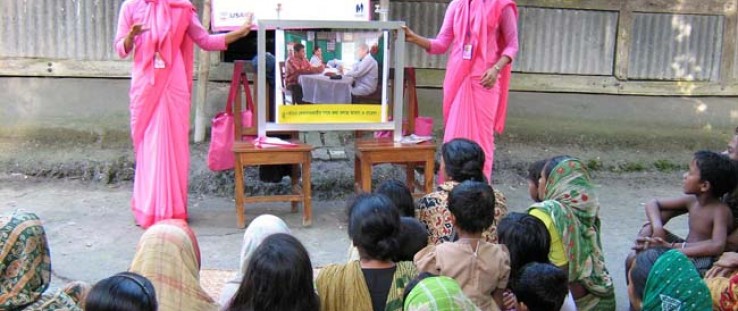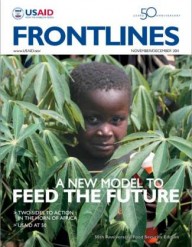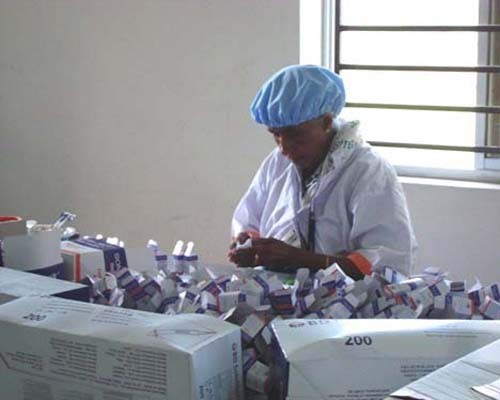 A courtyard meeting conducted by the Social Marketing Company trains expectant and new mothers on newborn care.
CREDIT: SMC PROGRAM TEAM, BANGLADESH
A courtyard meeting conducted by the Social Marketing Company trains expectant and new mothers on newborn care.
CREDIT: SMC PROGRAM TEAM, BANGLADESH
 A courtyard meeting conducted by the Social Marketing Company trains expectant and new mothers on newborn care.
CREDIT: SMC PROGRAM TEAM, BANGLADESH
A courtyard meeting conducted by the Social Marketing Company trains expectant and new mothers on newborn care.
CREDIT: SMC PROGRAM TEAM, BANGLADESH
Sabiha Begum has her hands full. As the mother of two—a toddler aged 1 ½ years and an infant aged 1 ½ months—she is busy all day with children and housework. But this 22-year-old’s main worry is that she will get pregnant again. The narrow birth spacing between her two children has already affected her health, but she is reluctant to take the standard birth-control pill because of fears that it could lead to a reduction in breast-milk supply experienced by some mothers.
A neighbor in Begum’s northern Bangladeshi town of Natore told her about the injectable contraceptive SOMA-JECT, which is provided at a Social Marketing Company (SMC) outlet located near her home. This contraceptive would not interfere with Begum’s ability to breastfeed. Begum and her husband Ashraf visited the outlet, received family-planning counseling, and on the same day, Begum was able to begin taking her tri-monthly injections. Now she feels relieved, knowing that her life is under her control.
The SMC was established by a USAID project that began in 1974, soon after Bangladesh achieved independence. Over the past 37 years, it has become regarded as a leading contributor to family planning, reproductive health, maternal and child health, and tuberculosis (TB) services in Bangladesh. The activities of SMC are based on principles of social marketing, which seek to apply commercial marketing techniques to solve social problems. Through massive promotion, distribution, and marketing of contraceptive products, SMC is ultimately responsible for 35 percent of the modern contraceptive use in the country. Its products protect almost 4.2 million couples each year.
The SMC began as an experiment in private-sector distribution of subsidized contraceptive methods using commercial marketing techniques to motivate people to practice socially beneficial behaviors and to purchase socially beneficial products and services at an affordable price. In 1980, SMC added oral rehydration solution to its line of public health products. In 1990, it was converted into a private entity, and since then has become the largest privately managed, not-for-profit social marketing organization in the world. At the outset, no one could have predicted then that the effort would lead to today’s network of 200,000 pharmacies, retail outlets, and health providers offering family planning products and services.
Family Planning as a Solution
Beginning in the early 1970s, social scientists began to look more closely at the relationship between high population growth and its potential impact on development. Small family sizes and spacing births not only improve health, but increase opportunities for education and economic development. In 1975, the total fertility rate in Bangladesh was measured at 6.3 births per woman. As rapid population growth and pervasive poverty threatened the food supply, governance, economic growth, political stability, and the environment, the Government of Bangladesh gave greater priority to the promotion of family planning.
In support of the Bangladeshi Government’s goal of increasing access to family planning services, USAID looked to private-sector solutions to expand knowledge, access, and the use of modern contraception. The Agency partnered with private-sector pharmaceutical outlets to promote contraceptive products—a new concept at the time. The idea was to make oral contraceptive pills widely accessible at an affordable price for middle- and low-income groups of people. While not the first of its kind, SMC is considered by many to be one of the most successful demonstrations of the positive impact social marketing could have on changing public health behaviors.
By 1991, the number of couples using some form of family planning jumped to 40 percent from 8 percent in 1975—a five-fold increase in 15 years. By 2010, the total fertility rate had dropped to 2.5 births per woman, according to the Bangladesh Maternal Mortality Survey. Increasing access to modern contraception proved to be an effective solution to improving the health and economic well-being of families, communities, and the nation.
Marketing Blitz
SMC products are advertised nationwide on billboards, signs, buildings, water tanks, shop boards, banners, rickshaws, shopping bags, and through sponsorship of sporting events and free promotional distributions. Even riverboats carry Raja Condom logos on their sails. In rural Bangladesh, roving vehicles present entertainment-educational films on family planning, including the use of contraceptive products, and other health issues. Advertising partners worked closely with SMC to develop creative products and programs and help broadcast mass media spots as well as sponsor local media events.
The SMC operates 12 centers around the country. These centers distribute products to over 220,000 local outlets, including pharmacies, grocery stores, and kiosks, making deliveries by van, motorbike, and even boat, when necessary. Through this network, the SMC has been able to reach every corner of Bangladesh.
But the campaign is more than just mass advertising. The SMC provides training to approximately 17,000 health providers annually to strengthen their knowledge and skills in health services, including counseling of couples on family planning topics. Pharmacists as well as rural and non-graduate medical practitioners serve as important sources of health information and medicine, particularly in rural, hard-to-reach areas.
Innovative Partnership
In achieving its current success, SMC has benefited from innovation on many levels. First, USAID partnered with private-sector pharmaceutical outlets to promote contraceptives, harnessing the power of the markets. As a result, more producers entered the market, creating healthy competition and improving access to contraceptive products while reducing costs of the products to the consumer.
USAID’s investment made a range of contraceptive products more affordable and accessible to the less-privileged people of Bangladesh. Because of USAID’s support, SMC was able to offer a range of affordable quality products, including oral pills, condoms, and injectable contraceptives, oral rehydration salts, and safe delivery kits.
The project’s marketing strategy is now recognized worldwide for its creative use of innovative channels to communicate health and family-planning messages. For example, an information, education, and communication center located on a boat focused on TB programming. It was so successful that messages were expanded to include other public health priorities. One video, Shukh Pakhi, or Bird of Happiness, has informed thousands of newly married couples about family planning by providing information on contraceptive options that suit their specific needs. Informing couples about available child-spacing options has been effective in increasing their acceptance and use of contraception.
SMC has not been alone in its efforts. The strategy was devised to complement and support the public sector’s national health plan as well as government distribution of health products and services.
“SMC meets a special need that no other organization, including the government, can provide as effectively. USAID’s investment in building a sustainable local organization has demonstrated that a private sector approach employing an extensive sales distribution network can support sustained delivery of public health products and services, especially family planning, at an affordable price,” said Dr. Sukumar Sarker, the senior clinical officer at USAID’s mission in Bangladesh.
The program’s success has depended greatly on the support of community leaders. “If SMC continues access to such health programs in the remote areas of Bangladesh, maternal and neonatal deaths will improve all over the country,” said Mostofa Kamal, a local government chairman.
Expanding Services
The SMC’s work has expanded well beyond family planning to address the country’s other pressing health needs. TB prevalence rates in Bangladesh are the sixth highest in the world. The SMC has instituted awareness campaigns throughout Bangladesh to promote the identification, referral, and follow up of TB cases. In collaboration with the National TB Control Program, the project uses portable movie screens, transported by road and waterways, to raise awareness on how to seek TB treatment.
In 1985, in order to combat diarrhea, the leading cause of death among children under age 5, the SMC launched a nationwide awareness and behavior-change campaign. Pre-packaged oral rehydration solutions were introduced and distributed extensively throughout the SMC network. The SMC reports annual sales in 2010 of more than 225 million oral rehydration solution sachets for diarrhea; over 1 million zinc doses for diarrhea; and more than 9 million micro-nutrient sachets for improved child nutrition.
The SMC’s efforts to combat child malnutrition focus on in-home food fortification. In Bangladesh, about 64 percent of children aged 6 months to 2 years old, and 42 percent of children aged 2 to 5 years old suffer from iron deficiency anemia. In line with USAID’s strategic goal to prevent malnutrition, SMC has introduced a micronutrient powder, popularly known as “Sprinkles.” This micronutrient sachet, branded “MoniMix,” is sold in bright yellow packages, and is mixed into a child’s basic meal to make healthy eating more appealing.
Putting Women and Babies First
In the southeastern region of Bangladesh, where the highest rates of childhood disease and mortality are concentrated, SMC launched the awareness campaign Jatone Ratan (Healthy Mother, Healthy Child) to complement USAID’s work in maternal and neonatal health.
Momota Begum is a 55-year-old woman living in the village of Boroitola in southwestern Bangladesh. Last year, her daughter-in-law and the baby she was carrying died during childbirth. “If the Jatone Ratan team had come a little earlier to explain safe delivery practices, my daughter-in-law and her child would have been saved,” Begum said tearfully. Though she grieves for her family’s loss, she is also determined to prevent maternal death from happening to others. “Until my death, I will make sure that such mistakes are never repeated,” she said.
In parallel with Jatone Ratan, the SMC launched a safe delivery kit in 2008. Over 20,000 are sold each year in Bangladesh. The kit includes supplies such as a clean bed sheet, sterile cutting tool, string, soap, and sterile gauze to support a clean, safe delivery in the home. Families may purchase the kits for their own use or for the use of a skilled birth attendant. Approximately 75 percent of deliveries are performed at home in Bangladesh, and clean, safe delivery materials can make a significant difference in the health of both mother and child. Though causal relationships are still being studied, SMC is also at least partially responsible for the country’s most astonishing health improvements, including a 40-percent drop in maternal mortality over the past nine years.
“We can confidently say that our long and unwavering investments in family planning have had a direct impact in lowering the total fertility rate, and thus the maternal mortality rate, in Bangladesh,” says Lily Kak, USAID’s senior country adviser for Bangladesh.
The Way Forward
After nearly four successful decades, it is easy to make the argument that the program has achieved its original goal of popularizing health products and services through social marketing. Today, almost 50 percent of pill users, 60 percent of condom users, and 20 percent of injectable users use SMC-branded contraceptives.
Finally, SMC has been able to recover 88 percent of its operational costs and is operating sustainably. SMC’s contraceptives social marketing model is now being used worldwide. “In many ways, the SMC reflects the very best of USAID’s new reform agenda, to highlight how the Agency does business—with new partnerships, an emphasis on innovation, and a relentless focus on results and staying power. USAID has engaged in a true partnership with SMC as a local private-sector partner in a conservative country where people lack adequate purchasing power,” said Dr. Sarker.











Comment
Make a general inquiry or suggest an improvement.